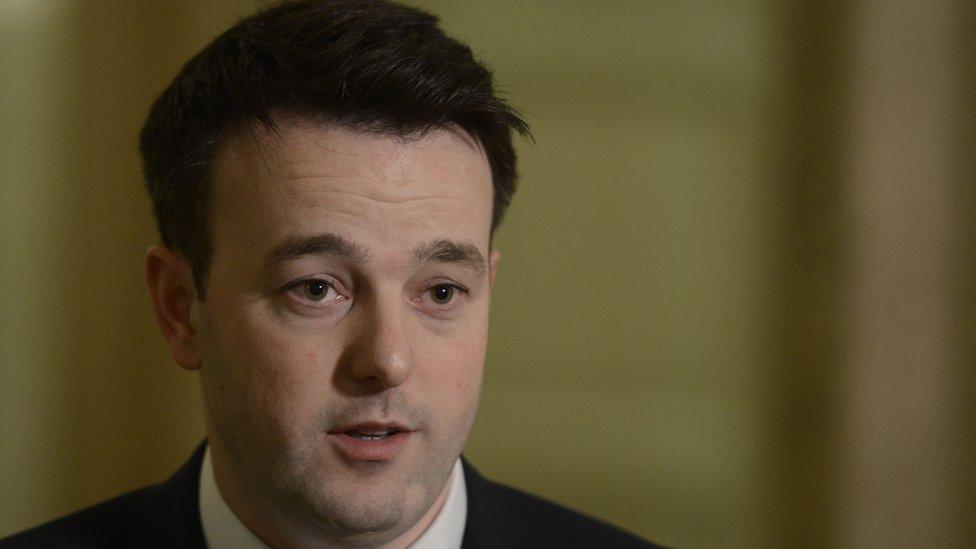DUP to recommend leaving EU to voters
- Published
Secretary of State Theresa Villiers is one of six government ministers to join the campaign for the UK to leave the European Union.
DUP leader Arlene Foster has said while her party remains Eurosceptic, members must decide for themselves how to vote in the EU referendum.
The prime minister has said Britain will vote on whether to remain in the EU on Thursday 23 June.
David Cameron announced the referendum date after a cabinet meeting on Saturday to discuss his deal with the EU he says gives the UK special status.
Mrs Foster said the DUP will recommend to voters to leave the EU.
"At every stage in this European negotiation process we had hoped to see a fundamental change to our relationship with Europe," she said.
"In our view, we see nothing in this deal that changes our outlook. Therefore we will on balance recommend a vote to leave the EU.
"As every voter has the opportunity to express a view, we fully expect that DUP members and voters will hold a range of differing personal views as to what is in the best interests of the United Kingdom.
"They are fully entitled to do so during what will be a momentous political debate about the direction of travel our nation chooses."
The SDLP and Sinn Féin are to campaign to remain within the EU, with the Alliance Party expected to do the same. The Ulster Unionists are still considering their position.

Arlene Foster said the DUP will recommend to voters to leave the EU
'Strong and positive campaign'
Sinn Féin's Martin McGuinness said the benefits of EU membership could "be felt daily across all sections of our society".
"In particular, our agriculture and agri-food industry have gone from strength to strength with the help of EU Single Farm Payments," he said.
"The EU has also supported key infrastructure projects and boosted our economy through peace and structural funds.
"It has also been a key supporter of the progress made in the peace and political processes over the last two decades."
SDLP leader Colum Eastwood has said the referendum will be one of the most important votes faced by people in Northern Ireland in decades.
"It is therefore vital that a strong and positive campaign is conducted to remain in Europe.
"The SDLP's campaign has already begun and today I am calling on the leaders of Sinn Féin, the Alliance party and the Green Party to do their utmost in ensuring that Northern Ireland delivers a strong vote to remain in the EU on 23 June.
"I would also urge the Ulster Unionist Party to do what is best for farmers and families and campaign for an In vote."
Meanwhile, the Northern Ireland Secretary of State has declared her intention to join the campaign in favour of leaving the EU.
David Cameron has suspended collective responsibility over the issue of the UK's future membership of the EU.
This means Eurosceptic ministers can campaign in favour of Brexit - against the official government position.
Theresa Villiers is one of five cabinet ministers who joined the "Leave" camp.
Others include Justice Secretary Michael Gove, Work and Pensions Secretary Iain Duncan Smith, Leader of the House of Commons Chris Grayling, and Culture Secretary John Whittingdale.
Employment Minster Priti Patel, who is not a full cabinet member, is also in favour of leaving.
Home Secretary Theresa May heads the list of those who have announced they will campaign to stay.
Other ministers who declared they will campaign to remain in the EU include Business Secretary Sajid Javid, International Development Secretary Justine Greening and Transport Secretary Patrick McLoughlin.

Colum Eastwood said the referendum will be one of the most important votes faced by people in Northern Ireland in decades
David Cameron announced the date of the referendum after holding a cabinet meeting on Saturday to discuss his new deal with the EU.
'Special status'
He says the agreement gives Britain "special status".
The DUP's Sammy Wilson said the negotiations prove the EU is not capable of reform.
The SDLP will be campaigning to stay in the EU and its leader, Colum Eastwood, said Mr Cameron is pursuing a "reckless strategy" which is "creating economic uncertainty across Ireland".
The Republic of Ireland minister for foreign affairs, Charlie Flanagan, has described the prime minister's EU deal as "positive" and "very significant".
Mr Cameron claims his EU reform deal - hammered out at a two-day summit in Brussels - will give the Britain "special status" within the bloc - tackling concerns over migrants getting "something for nothing" from the benefit system and exempting the country from the EU drive for "ever closer union".
But critics say it does nothing to tackle high levels of immigration or take back powers from Brussels, with UKIP leader Nigel Farage branding it "truly pathetic".
Alan Johnson, chair of Labour In for Britain, said his party would be "united in making the case that Britain is better off in Europe".